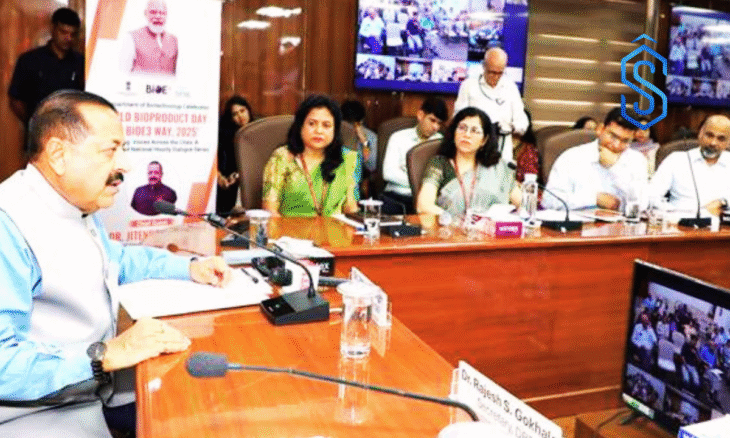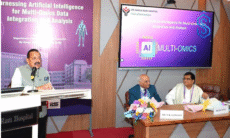New Delhi: Reinforcing India’s ambition to become a global biotechnology leader, Union Minister of Science & Technology Dr Jitendra Singh announced the government’s vision to grow the bioeconomy to $300 billion by 2030.
Speaking at the World Bioproduct Day celebrations organized by the Department of Biotechnology (DBT), BIRAC, and iBRIC+, the Minister urged citizens to see themselves as active stakeholders in India’s biotech journey.
The landmark event introduced ‘Voices Across the Cities’, a synchronized eight-hour national dialogue involving institutions across India.
From marine biomass to agri-residue valorization, each session showcased regional strengths and biotech innovations aligned with India’s BioE3 policy – a strategy focused on equity, economic growth, and environmental sustainability.
Also Read: BFI-BIOME and IIT Kanpur Bioinnovation Program Offers Grants Up to INR 10 Lakhs
“Biotechnology today is about more than lab experiments – it’s about livelihoods, sustainability, and nation-building,” said Dr. Singh. “India’s bioeconomy belongs to every Indian – from scientists and startups to farmers and entrepreneurs.”
Driving Grassroots Biotech Awareness and Startup Growth
Dr. Singh underscored the dramatic rise of biotech startups – from just 50 a decade ago to nearly 11,000 today – as a testament to progressive policy reforms, industry-academia collaboration, and growing investment.
The BioE3 policy, recently launched by the DBT, aims to accelerate biomanufacturing and scale up innovations that are socially relevant, commercially viable, and ecologically sustainable.
“India is already leading the next industrial revolution through the bioeconomy,” said Dr. Singh, highlighting applications in biodegradable packaging, sustainable personal care, and green rural employment.
The Minister called for deeper industry engagement, early-stage funding, and grassroots storytelling. He emphasized biotechnology’s relevance across sectors and geographies – from farms and oceans to industries and urban centers – and advocated involving voices from underrepresented communities like fishermen and tribal groups in future dialogues.
Also Read: CSIR-IGIB Opens India’s First National Biobank to Advance Precision Medicine
Education, Inclusion, and Social Outreach
Dr. Singh also linked biotechnology’s future to the success of India’s National Education Policy (NEP) 2020, which encourages flexibility, skill alignment, and creative thinking among youth. He addressed the need to break away from outdated educational models and instead nurture talent in sync with real-world biotech needs.
Meanwhile, Dr Rajesh S Gokhale, Secretary, DBT and Chairman of BIRAC, shared the implementation roadmap for the BioE3 Policy, including:
- Region-specific biotech missions
- Support for pilot-scale manufacturing
- Academia-industry collaborations
- Focus on rural biotech innovation
Dr. Singh encouraged localized communication in regional languages and called for stronger digital storytelling to inspire youth and broaden biotech’s public engagement.
“If we want to attract young talent, we must link biotechnology to livelihoods, not just lab careers,” he added.
A New Chapter in India’s Bioeconomy
With India leveraging its diverse natural resources, rich traditional knowledge, and fast-growing tech ecosystem, the $300 billion bioeconomy goal appears both bold and achievable.
As biotechnology moves from research labs to real-life applications, India’s bioeconomy narrative is being rewritten as inclusive, impactful, and innovation-led.










